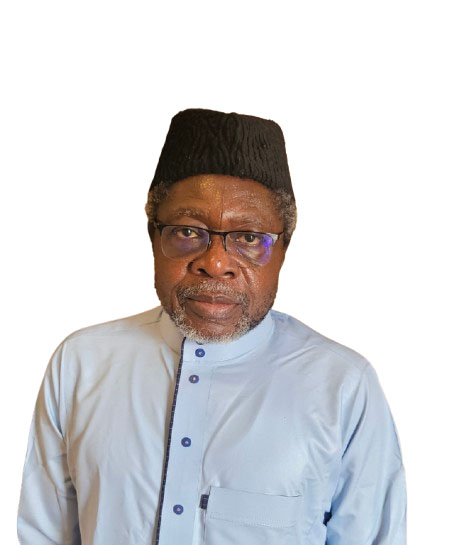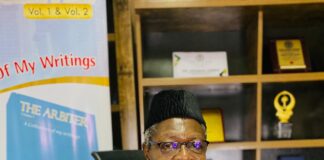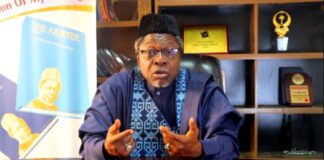The Katsina Extravaganza and the Shata–Rarara Debate, by Hassan Gimba
The Arbiter
About three weeks ago, President Bola Ahmed Tinubu was in Katsina, where he charged the Nigerian Army to end the terrorism menace and reclaim every inch of the nation’s territory. He also strongly warned: “Let the enemies of Nigeria know — their time is up.”
READ ALSO: Banditry and our quest for leadership, by Hassan Gimba
After other state engagements, he honoured an invitation to attend the wedding of Governor Dikko Radda’s daughter — an event where guests were treated to lavish entertainment. Recall that the Governor, about two months earlier, had lost his beloved mother.
Were Hajiya Sarafa’u Umaru, who died at the age of 93, to be asked, she would have said her death should not stop or even delay the marriage of her granddaughter. It is only that her children, having witnessed the deaths of loved ones over time, may ask themselves, “Why engage in vanity and vainglory? How would I feel if Mama looked down from the Lord’s bosom and saw me gathering the world to dance on her fresh grave?”
Be that as it may, biki ya yi biki, as the Hausa are wont to say. Mr. President was there, and many side attractions showcased power, such as when an Emir’s guards broke through a door shut to latecomers, simply because an Emir never turns back from obstacles.
Musicians regaled everyone, but the doyen, Dauda Kahutu Rarara, stole the show when he even made President Tinubu laugh in admiration with beautiful lyrics in Yoruba.
Forget that at the height of the insurgency, when former President Goodluck Ebele Jonathan went to Kano — not for any festivity like the one witnessed — and danced on stage, Rarara sang a song, Mai Malafa yaje Kano (Hat-wearing Man was in Kano), that trended against the man who grew up without shoes.
Katsina, the state of former President Muhammadu Buhari, has been engulfed in recent times by a cloud of insecurity. Banditry and kidnapping have become daily occurrences, relegating previously serious crimes like robbery to the background.
Just last week, residents of Tashar Kaɗanya in Ƙankara Local Government Area were thrown into despair after bandits imposed a ₦60 million levy on the community, threatening an attack on the people if they do not meet the demand. Faskari, Bakori, Malumfashi, Musawa, and Dan Musa Local Governments border Ƙankara. On its southern edge lies Zamfara State.
Why wouldn’t they panic when over three hundred boys from Government Science Secondary School, Kankara, were kidnapped on 11 December 2020 and released some nine days later, after ransom was paid, according to The Wall Street Journal (WSJ), which interviewed some of them?
READ ALSO: Kankara And The Postponed Dawn, by Hassan Gimba
Many communities in Katsina are isolated, having been cut off because linkage roads are now inaccessible, taken over by bandits who are interrelated with Boko Haram. In many areas, bandits appoint community heads and collect taxes. People pay them to be allowed to farm and, again, to be allowed to harvest.
Just last Friday, a traditional ruler, Malam Sani Dandada, the Madawakin Fawa of Faskari, who was kidnapped on his way from Daura on 19 April, was found dead, despite full ransom payment.
Katsina is now synonymous with banditry. It has become so pervasive that some unscrupulous civil servants, politicians, women of easy virtue, security agents, traditional rulers, and others from across all segments of society work with the bandits.
During a media briefing on the International Day of Education (IDE) in January, the UNICEF Chief of Kano Field Office, Rahama Mohammed-Farah, revealed that the North-West had the second-highest number of out-of-school children in Nigeria, after the North-East.
About 10.2 million children at the primary level are out of school in Nigeria. Sixteen per cent of them are from Kano, Jigawa, and Katsina States — with Katsina alone having 536,112 out-of-school children,” he said. Already, 38% of school-aged children in the state lack access to education.
Katsina State, including its capital city, also faces significant challenges in providing potable water. This lack of consistent, safe water access leads to various health, social, and economic problems. According to data from the National Bureau of Statistics (NBS), 61% of households in the state lack access to sanitary facilities, and 39% lack access to clean drinking water. The NBS data also shows that there are 2.8 million poor persons in Katsina out of a population of around 9.3 million.
Have we ever stopped to ask ourselves about the correlation between extravagance by public office holders and the lack of employment, the production of unemployable citizens, poor health facilities, and other essential social amenities? Or the relationship between all these and the surge in all types of crimes?
Yet our ruling elite and public commentators did not look at the Katsina extravaganza through this lens. Instead, they opened a debate on who the best Hausa musician is between the late Mamman Shata and Rarara — a needless discussion akin to comparing Pele and Cristiano Ronaldo, each defined by their time, circumstances, and environment.
As long as we don’t hold those to whom we entrust the key to our treasury accountable — as long as we get carried away by their excesses, clapping for them and floating on the crest of their diversionary indulgences — they will continue to consider us their lapdogs, tossing us bones to keep us at bay.
It’s high time we demanded accountability and transparency from our leaders, for the sake of our children and the children of their children.
Hassan Gimba, anipr, is the CEO/Publisher of Neptune Prime.






Nice piece but will certainly not sink with the political elites who should have learned or even the sycophants around them including the errand musicians. Gone are the days when public opinion could be shaped by musical renditions like it did in 2015 in the north for the true identity of the artists have come to light.
Recently I heard a lyric from an unknown female Hausa artist who sang about *Chanchanta* ba *jam’iya ba*. I hope and pray come 2027 this will resonate not only in the backward north, but across the country so we would have people who will be accountable to us not enslave us in their greed.
Let us hope and pray so, my brother. Thank you.
Indeed sir while they were lavishly dancing in awe, the masses are in agony of the humongous act of bandits Allah ya kyauta.
Sadly! Ameen.